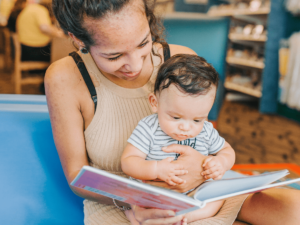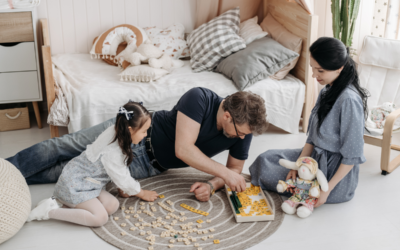Books and stories are one of the magical properties of the world. To get lost in a good story for hours upon end of an evening or enjoy a book on a topic that interests you while laying back in the sun, it is a past time that many of us enjoy.
Reading with our children is an extremely meaningful experience that many parents look forward to this quality time together bonding with their child over a good book. It is common for parents to sit and read with children between the ages of one and three with three in four parents doing this, but these numbers decrease dramatically for infants and also children over the age of five. Liza Baker who is the director at Scholastic, said that “we’re blown away time and time again that kids say the most special time they recall spending with a parent is reading together”. This is cherished time for a child and the majority of children relish and look forward to the routine time they get to sit down with a parent and read together.
Study after study shows that getting in early reading with children helps them learn to speak, bond with parents, interact and read early themselves. Consistent reading also helps children to develop a larger vocabulary and helps them to build confidence for when they start school.

We have pulled together some tips to help you feel more confident in your reading journey with your child.
Start young
It may seem pointless to be reading to an infant who cannot even speak yet, but you may be surprised at the benefits that reading when your children are very young can have. Firstly, it helps children to start to understand what reading is, what books are and to gain an understanding of the importance of reading. If you are doing it as part of the child’s daily routine, it helps them to see that it is a big thing in their life. Infants can start to point at the book, point at the pictures and as you say the words at the same time, they can start to associate the matching between written and spoken words. At this young age, it can also start to spark imagination for the child that will grow as they continue to get older. With toddlers it may seem pointless to read to them as they just want to squirm and grab the book, but regular reading can actually help them with concentration and teach them to sit still for longer. This may not seem like it is working when they are active toddlers, but it does pay off when they start school.

Read beyond
As your child starts to get older it is important to read beyond their reading level. This means getting a book that uses words or sentence structure that they can’t quite read themselves yet and reading it to them. It helps them to stretch their understanding and also gives them motivation to improve their skills.

Encourage Conversation
You may find it frustrating if your child likes to interrupt you regularly as you are reading to ask questions or make comments, but this is actually healthy and encouraging for the child in understanding what they are reading. If your child is not asking questions, it is great if you ask them some to get them thinking about what you are reading and have them engage in the reading time. Some younger children will need processing time from some books and so you may find they will come to you later and ask questions the next day.
Look for Diversity
Reading books is one great way to teach your children about diversity and for them to learn about people who live lives different from their own. This also teaches them empathy and kindness as they experience people in school who are different as they have learned about people through their reading. Look for books that have culturally or ethnically diverse storylines and characters. You can also find books that are on topics about sharing, being kind and making friends. This can help prepare children for when they start school.
Choice Rules
Did you know that 89% of children aged between 6-17 agreed that their favourite books are ones they had picked out themselves? To help children love reading you can encourage them in picking out books they may enjoy and helping them to learn to know what they like to read. After you finish reading a book you can ask them what they liked about that book and then over time you may find your child likes to read books with animals in them, or maybe ones about history. Then next time you go to the library or look online for books, you can help them find a section that is about the topics they are interested in. Then let them pick out a book they want to try. The local community librarian or school librarian are also a great resource to help your child find books they are interested in.

Finally
As you can see there are a great range of benefits to reading to your children at all ages. Many parents stop reading to their children once they can read by themselves and many children say that they wished their parents still would read to them until they were much older. The general rule that you might find helpful is to keep reading to your children until they tell you they don’t want to anymore. To encourage your children to enjoy reading the best way is to make books easily accessible for them. Have low shelves in your home for them to get the books off, have them in their room, playroom and also take them with you when you go to a doctor’s appointment or are doing the groceries. Having them ready for them helps them to start to learn to enjoy reading more and you will find they may even start asking for them.
The bond that you create by reading to your children will outlast the years and will be something both you and your child will always remember.
Not sure what to read?
Research shows that kids of all ages like a book that makes them laugh. So, this is a good start.





